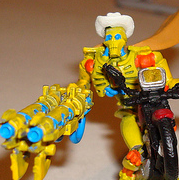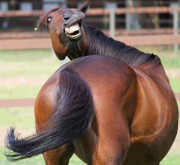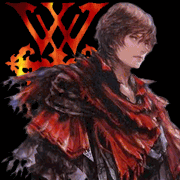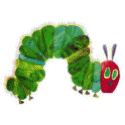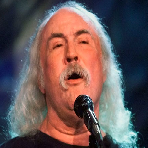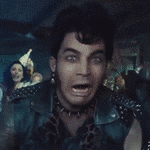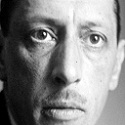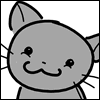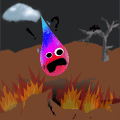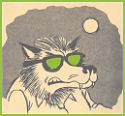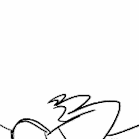|
If you haven't started to judge me based on my reading habits now would be a good month to start. Challenge... of the Booklord!
Books by non-white authors: 2 Non-fiction: 3 April I fell off the wagon hard. I started reading Trek tie-in books again. 34. A Stitch in Time by Andrew J. Robinson Memoirs of a Tailor. Andrew J. Robinson's performance as Garak over the years showed that he put a lot of thought into the character. With the series over he's written one of the best Trek tie-in books I've read to to tell the story of Garak's rise and fall that led him to become the plain, simple tailor of Deep Space Nine and also to give a glimpse of what has happened to Cardassia since the end of the series. 35. Nightmare on Clover Street by Andy Click Another awesome entry in the Werechaun series! The author has again created another fun story that combines action, humor, and the paranormal for a unique entry in urban fantasy. 36. The Dinosaur Four by Geoff Jones Poor descriptions, stilted dialogue, mostly unlikable characters, an unimpressive opening, and a supremely disappointing ending. The dinosaurs, by virtue of not being POV characters, are the best written part of this. When the dialogue and character thoughts aren't stilted they're just repetitive. I'll give the author one thing, he is really good at making some of these characters unlikable. I paid a dollar for this so you didn't have to. 37. A Brief History of Time: From Big Bang to Black Holes by Stephen Hawking Hawking's general overview of Cosmology is an interesting read and great for someone like my who is interested in physics but is not a physicist. If you're interested in the universe at all I'd highly recommend this work. 38. 20,000 Leagues Under the Sea by Jules Verne Reread. Its a little more dry that what I remember, but it was still a great read. 39. The Time Traders by Andre Norton A young adult cold war time travel adventure story. It was alright. I didn't really care for the main character for most of the book, but the premise is solid and it the author does a good job of keeping the story flowing. 40. Chanur's Homecoming by C.J. Cherryh A long, mad dash to the finish line. This really felt like the author didn't realize how many loose ends they had until they sat down to write this. The characters repeat the same information over and over again and since absolutely everything is rushed and urgent it just all ends up feeling exhausting. 41. The Belly of the Beast by Dean Wesley Smith "My ship, whom I love like a woman..." is my favorite line from the Futurama episode "Where No Fan Has Gone Before" because it is a perfect example of the majority of fan fiction. It's stilted, cliche, and renders the characters cardboard cutouts of the the characters from the original media. On every single page of this book I was reminded of that line. The dialogue is awkward and unnatural, the characters from the show are flat imitations, the new characters are uninteresting, and the mess is full of weird random blocks of exposition. Frankly this is not a promising start to the S.C.E. series. 42. Galactic Derelict by Andre Norton Cold war young adult/boy's adventure in time & space. A lot lighter on the cold war theme than the first book in the series, this one makes good on the promise made in Time Traders of space adventure as the team find themselves the accidental crew of a twelve thousand year old space ship's attempt to return home. I liked it. It was a fast read with a straightforward plot with a couple of interesting bits. 43. Fatal Error by Keith R.A. DeCandido The second SCE book picks up almost where the first book left off, but it appears that in the brief break between stories the da Vinci stopped at Starbase Competent Writer and resupplied on plot, dialogue, and characterization. The story is a bit of a homage to a few classic TOS episodes, with a massive central computer that controlled everything about an alien world and its civilization, but this time when things go wrong Starfleet is there to correct the issues and not talk the computer to death. Overall it was a fun little story that felt like it could have been slotted into one of the Trek shows. The author's exploration of the Bynar character's development without their bonded pair was a bit shallow, but that's to be expected from a 100 page long action/technobable story. Compared to The Belly of the Beast the characters are more lifelike, the dialogue is feels natural, and when the previous book left Geordi on the da Vinci Mr. DeCandido wisely put him in the background to let the new characters shine. 44. Hard Crash by Christie Golden It's not as bad as the first book in the SCE series, but it has put me off from wanting to read anything else by the author. Hard crash is the least action oriented of the SCE stories so far, but the characters haven't gotten enough development to carry a mostly dramatic story. While the premise is sound I think the awkward dialogue really turns this down to at best second tier daytime tv levels of melodrama near the end. The short length and steady pace are the only real saving graces of Hard Crash, so I'd recommend not bothering with this one 45-46. Interphase, Part 1 & 2 by Dayton Ward, Kevin Dilmore It looks like the "Even Numbered Trek" rule is going to hold firm with the SCE books as the fourth entry into the SCE series is well written, with natural dialogue (well, as natural as sci-fi dialogue can be), and characters who feel like they exist for more than to just push around plot bricks. The authors make good use of the existing Trek setting and some dangling threads from the Original Series to tell a fun and fast paced first half of a story. 47. The Lost World by Arthur Conan Doyle It's slow, but hey, at least it's also boring. 48. The Big Time by Fritz Leiber An decent mystery, a well written main character, and a neat setting. I can definitely see why this won a Hugo. 49. 1632 by Eric Flint I really enjoyed this one. It's well written with varied and interesting characters, while the dialogue feels a little hokey in places it never feels forced, and while the technological superiority of Grantville is unquestionable it doesn't magically solve all of their problems. Not being well educated about the particular historical setting of the novel I can't say one way or the other whither or not it's at all accurate but except for a few info dumps throughout the novel the author does a great job giving you what you need to know for the setting. 50. Star Trek (Bantam Star Trek #1) by James Blish This first book in the series (simply named “Star Trek”) adapts “Charlie X” (under the episode’s earlier working title of Charlie’s Law”), "Dagger of the Mind", "The Unreal McCoy" (which was the working and IMO better title for a.k.a. "The Man Trap"), "Balance of Terror", "The Naked Time", "Miri", and "The Conscience of the King" This book, clocking in at 140ish pages, doesn’t much page count to the seven episodes it covers. The story “Charlie’s Law” is bereft of most description, (Blish apparently felt no need to describe the Enterprise in even light detail), but most of the other stories have some feature at least some light description at the beginning to set up the story. Thishis adaptation of “balance of Terror” is entirely from the Enterprise’s POV, which helps to convey the tense nature of the episode very well, though the story lacks much of the cat and mouse nature of the episode and ends rather abruptly and without the famous “In another life we could have been friends” line. The Naked Time has lost any of the emotional tones of the episode. Miri is short and too the point, cutting most of the interactions with Miri and the children (this may be to its benefit.) The Conscience of the King is short to its detriment, gutting all but the basic core of the story. There are a couple of instances where the author seems to have been functioning from the idea that ships in Star Trek function at relativistic speeds. (also the cover of the edition I read has nice big rocket plumes coming out of the back of the Enterprise. There are a few things about the book that make in an interesting read as a star trek fan, but its brevity and extremely shallow treatment of the episodes mean I can’t really recommend going out of your way to pick it up. However if you’re like me and you find it in the dollar bin of your local used book store I’d give it a read. 51. Star Trek 2 (Bantam Star Trek #2) by James Blish This edition of “Let’s summarize an episode of Star Trek” includes adaptations of Arena, A Taste of Armageddon, Tomorrow Is Yesterday, Errand of Mercy, Court Martial, Operation--Annihilate!, The City on the Edge of Forever, and Space Seed. I can already feel Harlan Ellison spinning in his grave. Arena is about how I remember it from the show. Blish does a good job setting the scene of the, well, arena world and the Gorn. A Taste of Armageddon is a brisk retelling, but the characters all feel accurate to the show. Tomorrow is Yesterday felt like one of those really loud 1960’s computers that Kirk used to talk to death spit out a summary of the episode “BEEP BOOP” The Enterprise goes back in time, picks up a jet pilot, then returns him, then returns to the future “BEEP BOOP” Errand of Mercy, Court Martial, and Operation--Annihilate! are all just brief run throughs of the working scripts of the episodes, nothing really impressive or groan-worthy. The City on the Edge of Forever has this little note at the beginning stating that the author tried to stay as close to the script Ellison sent him, and except for a missing scene or two and a change to the closing lines it’s a pretty solid retelling of the episode. Space Seed is about as quick a run through of Space Seed you could manage without actually cutting plot points. I guess the few extra pages for City on the Edge of Forever had to come from somewhere. Star Trek 2 is a collection that is very workmanlike. Nothing fancy, get the job done and do it quickly. I can only imagine the policies Blish was working under when writing these. Unfortunately the writing situation doesn’t cound for much in the final verdict. I’m giving this one two of five stars. Only really of interest to the most die-hard of Trek fans. 52. Star Trek 3 (Bantam Star Trek #3) by James Blish This volume in Trek Charm-ectomy includes The Trouble With Tribbles, The Last Gunfight, The Doomsday Machine, Assignment: Earth, Mirror, Mirror, Friday's Child, and Amok Time The Trouble with Tribbles has a few differences from the episode, like the joke at end is different. This is the first comedy episode Blish has adapted and he doesn’t do a good job conveying the humor of the episode at all. The Last Gunfight (aka the Cowboy Planet episode) was dunb on the show and is a waste of pages here. The Doomsday Machine lacks the tension of the episode and reads like a log entry of the events. Mirror, Mirror is the first adaptation in this collection I’d say was worth reading, but only just. It maintains Kirk’s fight to save the Mirror Halkans, the difficulty the crew have with maintaining the deception, and the impassioned speech to mirror Spock at the end, but to do so it cuts all but a mention of the agony booth and completely removes Marlena Moreau and the Tantalus field. Friday's Child is so forgettable an episode when I finished reading its novelization I still couldn’t tell you what it was about. Amok Time has a slightly different sequence and kills the Death of Kirk suspense by giving you his point of view while he passes out but is otherwise unremarkable. Star Trek 3 isn’t so awful that I want to give it one star, but I can’t really bring myself to give it anything else than that. At this point in history only the most enthusiastic Trek fan will want to read these, and three books in I already want to skip to the next series of books One Star out of Five. 53. Star Trek 4 (Bantam Star Trek #4) by James Blish The episodes novelized in within include All Our Yesterdays, The Devil in the Dark, Journey To Babel, The Menagerie, The Enterprise Incident, and A Piece of the Action. I’m pretty sure that All Our Yesterdays is the first Trek episode Blish has novelized where he keeps the multiple storylines from the episode. Within we follow both Kirk in ye olden not!London and Spock & McCoy in the Ice Age. It breezes through the story while being a solid retelling of the episode. The Devil in the Dark actually manages to maintain some of the mystery of the episode it’s based on while still condensing where it can. Journey to Babel is is the 2x speed version of the story. The Menagerie is actually just The Cage as the author’s forward to the story makes clear that the wraparound would have just been lost pages. I’d tend to agree with him as the novelization of the story manages to retain everything except the crew trying to blast their way into the Talosian base. I applaud Blish for managing to fit a rather dense episode into an extremely limited page count. The Enterprise Incident is shortened by mostly following Spock’s role in the story, a fair decision on the author’s part. A Piece of the Action is one of my favorite episodes and I’m glad to say the author does a pretty good job of adapting it to the short story format. Overall I’d say that this is a marked improvement over the previous three books and at three of five stars is something I’d recommend picking up if you stumble across it in a used book store somewhere. I'm planing on knocking out the last five books in the challenge in May.
|
|
|
|

|
| # ? Jun 6, 2024 15:52 |
|
read the sebald!!!
|
|
|
|
April - 5: 14. The Girls of Room 28: Friendship, Hope and Survival in Theresienstadt (Hannelore Brenner) 15. Equal Rites (Terry Pratchett) 16. Invisible Cities (Italo Calvino) 17. Iron Curtain: The Crushing of Eastern Europe 1944-1956 (Anne Applebaum) 18. Running with the Kenyans (Adharanand Finn) I liked all of my books this month. I read Invisible Cities as my postmodern book (incidentally it was really cool and weird and I wish I'd read it ages ago) like every single other person in this thread and since "the Red Army" appears as a phrase about a hundred million times in Iron Curtain I'm crossing off that one too. I read Notes from Underground too but it's in a book with The Double and I figure since they're both really short I'll just count them together. I'll count it as my absurdist book - I'm not sure it neatly fits in but the boundary between existentialism and absurdism is pretty grey and it definitely felt pretty absurd. 40 is looking like a pretty lax goal but I'm sure things are going to get super tough relatively soon at work so I figure I won't stretch it yet. Year to Date: 18 01. The Establishment: And how they get away with it (Owen Jones) 02. Mussolini and Fascist Italy (Martin Blinkhorn) 03. Love in the Time of Cholera (Gabriel Garcia Marquez) 04. All You Need is Kill (Hiroshi Sakurazaka) 05. Theft: A Love Story (Peter Carey) 06. Stalin (Kevin McDermott) 07. Heart of Darkness (Joseph Conrad) 08. Revenge (Yoko Ogawa) 09. The Good Soldier Svejk and his Fortunes in the Great War (Jaroslav Hasek) 10. The Buried Giant (Kazuo Ishiguro) 11. after the quake (Haruki Murakami) 12. The Colour of Magic (Terry Pratchett) 13. The Light Fantastic (Terry Pratchett) 14. The Girls of Room 28: Friendship, Hope and Survival in Theresienstadt (Hannelore Brenner) 15. Equal Rites (Terry Pratchett) 16. Invisible Cities (Italo Calvino) 17. Iron Curtain: The Crushing of Eastern Europe 1944-1956 (Anne Applebaum) 18. Running with the Kenyans (Adharanand Finn) Booklord categories: 2, 3, 5, 8, 9 11, 13, 15, 18, 19, 21. Living Image fucked around with this message at 09:36 on May 25, 2015 |
|
|
|
Lumius posted:read the sebald!!! My copy of The Emigrants arrived and is in my bag right now. I intend to start on it during lunch.
|
|
|
|
Slow year so far... lucky I'm slowly transitioning out of my old job and into a new one that's less draining and even has occasional downtime I can use to read so hopefully I'll gain some momentum from here. 1. The vanilla read a set number of books in a year. [3/20] 5. History 6. An essay 7. A collection of poetry 8. Something post-modern 9. Something absurdist 10. The Blind Owl (Free translation if your ok with reading on a screen or cant find a copy!) 11. Something on either hate or love 12. Something dealing with space 13. Something dealing with the unreal 14. Wildcard (Some one else taking the challenge will tell you what to read) 15. Something published this year or the past three months 16. That one book that has been sitting on your desk waiting for a long time 17. A play 18. Biography 19. The color red 20. Something banned or censored 21. Short story(s) 22. A mystery 01: Sophie's World - Jostein Gaarder. Read for my Nature of Intellectual Inquiry class. A history of philosophy from ancient times to Sartre, strung together by a metanarrative that starts off simply as the story of a girl taking philosophy lessons and quickly gets weird. I first read it in sixth grade for another class but didn't really "get" it--no interest in philosophy as a 12-year-old. I liked it well enough, it's a good overview of the broad themes and major players of philosophical thought throughout history. Anyone with any real interest or education in philosophy won't get anything out of it, though, it's very much Baby's First Philosophy but as someone with no education in the field at all I think it worked as an accessible crash course. 02: Aging With Grace: What the Nun Study Teaches Us About Leading Longer, Healthier, and More Meaningful Lives - David Snowdon. Read for the same class. I honestly don't remember much about this one, it's been a while and it's not a subject I have much interest in. A book about a study on a community of nuns regarding the way our bodies and particularly our brains age. I feel weird leaving it at that but honestly I can't bring up anything else... just a book I read for class and forgot about when there were no more quizzes. 03: The Palace of Illusions - Chitra Banerjee Divakaruni. Finally, a book read for fun! A retelling of the Mahabharata from the perspective of Draupadi/Panchaali, the central female character who aids her five husbands in taking back the kingdom that is their birthright from usurpers. I loved this one, Panchaali was one of the most engrossing narrators I've read in a long time. There's a sort of genuineness to the character, she's complex and believable in a way that not many authors achieve with their characters, in a way that reminded me of Jhumpa Lahiri, my all-time favorite fiction author (Apparently the two are friends, which makes me edit: Also, what's the policy on counting one book for multiple challenge categories? I did it for Palace of Illusions since Divakaruni is a non-white woman (I could also count it as a book about love and hate being that the power of both is a solid theme throughout but I thought counting the same book three times was pushing it) but the book I just started is also by a woman so I can count that one once I finish if it's frowned on. Punished Chuck fucked around with this message at 02:29 on May 4, 2015 |
|
|
|
^^ I think it's up to you whether you count one book for multiple categories. 1. The vanilla read a set number of books in a year. [19/52] 4. Philosophy 5. History 6. An essay 7. A collection of poetry 9. Something absurdist 10. The Blind Owl (Free translation if your ok with reading on a screen or cant find a copy!) 13. Something dealing with the unreal 17. A play 18. Biography 19. The color red 21. Short story(s) 22. A mystery A slow month for me, but a few great books. 16. Half a King (Joe Abercrombie) A decent fantasy novel. I didn't like it as much as the First Law trilogy. 17. We need to talk about Kevin Lionel Shriver) Eva writes letters to her husband Franklin about their son Kevin, two years after he committed a mass murder at his high school. For me this was a difficult read, but worth it. It started off very slowly with Eva writing about the time leading up to Kevin's birth. She is insistent that there is something abnormal about Kevin from the moment he is born, which is very strange, but then Eva can't be objective about anything to do with Kevin. The real question here is was Kevin born "evil" or was it his upbringing that made him so. How harshly should we judge Eva? 18. Cold Comfort Farm (Stella Gibbons) Obviously it is satirical of a certain kind of early 20th century rural romance and so the plot consists of suitably ridiculous episodes and coincidences, but as well as that has completely out of place references to video telephones (and yet people still use telegrams too) and jaunting about in aeroplanes. Bizarre. 19. Dispatches (Michael Herr) Michael Herr was a war correspondent in Vietnam for Esquire magazine. Dispatches is a vivid description of various episodes of his time there as he travels around the country talking to the "grunts" and ends up in altogether insane situations. Indescribable for me.
|
|
|
|
8one6 posted:40. Chanur's Homecoming by C.J. Cherryh This is definitely the most rushed of the five Chanur books, I think, but I love it just because the epilogue is so drat WeaponGradeSadness posted:edit: Also, what's the policy on counting one book for multiple challenge categories? I did it for Palace of Illusions since Divakaruni is a non-white woman (I could also count it as a book about love and hate being that the power of both is a solid theme throughout but I thought counting the same book three times was pushing it) but the book I just started is also by a woman so I can count that one once I finish if it's frowned on. I generally count a book for all the categories it applies to, but if I later read something else that counts for some of those categories I count that one instead to minimize duplicates.
|
|
|
|
MonotoneKimi posted:^^ I think it's up to you whether you count one book for multiple categories. You done gone read good books. Now I want to read Kevin.
|
|
|
|
thehomemaster posted:You done gone read good books. Now I want to read Kevin. You should!
|
|
|
|
thespaceinvader posted:1: Cryptonomicon by Neal Stephenson Brayan's Gold is a Brett short story to ease me back into his world for my next book which will be The Skull Throne. It was very short, pretty good, and worked well where Brett shines (Arlen kicks the poo poo out of demons) and not so well where he doesn't (any time a woman is on screen or discussed) - I really hope that The Skull Throne doesn't continue the trend of really loving weird gender dynamics, but I'm not expecting much. If it's not much good, I'll probably stop reading the series there, but the preview I read the other week seemed OK.
|
|
|
|
I've been meaning to read more books and this looks like a good way to keep up some motivation. If it isn't too late I'd like to throw my hat in the ring to read 30 books by the end of the year. I don't have any specific goals, so the default challenge sounds pretty good. It should expose me to some things I might not otherwise read which is always a plus.
|
|
|
|
saphron posted:saphron posted: A weird month, a lot of ambivalence, and maybe a little regret in retrospect. Welp! 13. Ink and Steel by Elizabeth Bear I received this as a Christmas gift from a friend and didn't realize this was part of a larger series when I started. I'm not sure what context I was missing as a result, but I enjoyed the book as a a an entertaining alt-history Shakespeare/Marlowe slashfic with a bit of Faerie thrown in for good measure. Fun enough to finish, but I don't feel compelled to seek out other books from the series. 14. Vision in Silver by Anne Bishop Vision in Silver is book 3 of Bishop's current urban fantasy series, but unlike a lot of urban fantasy stories (or at least, of the ones I've read, and I haven't read a lot so ymmv), the werefolks and vampires are the natives who belong there, and the humans are the intruders. There's a pretty ham-fisted allegory of the land as an alternate America, and Meg, the main protagonist, still grates on me from time to time, and the familiar strain of 'love the land and love nature' that always runs through all of her stories...but I have a teenage-sized soft spot for Bishop's stuff. It was good fluff reading for the next book, which I was reading at the same time... 15. Autumn in the Heavenly Kingdom: China, the West, and the Epic Story of the Taiping Civil War by Stephen R. Platt (5. A History) Platt's account of the Taiping Civil War tells a tale of the bloody 14-year Chinese civil war that helped define the foreign policy of modern China. I picked this book up because I wanted to learn more about the era surrounding the Opium Wars and...man, this entire era of colonialism is a cavalcade of misunderstandings and terrible poo poo. Platt chose not to cover the entire civil war, but instead focuses on providing both domestic and international motivations that drove the civil war from bad to worse -- like how much the British treatment of the Taiping civil war and the American civil war both influenced British actions in both countries and (perhaps inadvertently) shaped the futures of both. This is a history book with a thesis, but a well-articulated one that is well worth the read if you're curious about modern Chinese history. 16. Satin Island by Tom McCarthy A (probably?) postmodern novel about an unfullfilled corporate anthropologist charged with the impossible task of writing a definitive study on mankind in the modern era. Despite veering close to precious at times, I enjoyed the book...mostly. I especially liked the passage about participant ethnography, but I could sympathize too (maybe a little too well) with the quest to clean a desk to unblock your brain, or staring intently at buffering bars. Admittedly, I was pushing to read the book the night before a book club meeting, but I ended the book feeling as disconnected from the main character as the main character was to the world around him. Weird, to be sure. I'm almost done with K.J. Parker's Academic Exercises, which I'm really enjoying, and just started my challenge book as well (The History of the Siege of LIsbon). There's a bunch of physical books I should get around to reading too, but so far I've been reading in bed with my Kindle instead. First world problems, I has them. 
|
|
|
|
thespaceinvader posted:1: Cryptonomicon by Neal Stephenson Perfect State was a great little Sanderson novella. I can't help but feel that BranSan is by FAR at his best when writing short fiction. Much as I like his epics, and they give him room to really develop stuff... his skill as a writer shines through a lot more when his space is sharply limited. His best works for my money have been novellas - The Emperor's Soul and Firstborn. Perfect State isn't up there with his best, but he gets a lot of character development and world building out of a relatively tiny amount of space, not to mention raising some interesting philosophical questions about the world he's built. Heartily recommended. I'm on a Sanderson novella kick right now as my birthday's coming up and I've asked for some books, so I don't want to pick up anything I'm wanting to read soon, in case someone's got it for me already...
|
|
|
|
Ok I finally am ready to post some more. 1. The vanilla read a set number of books in a year - 40 2. Read a female author - Glenda Dawn Goss, Sibelius, a Life 3. The non-white author - Shohei Ooka, Fires on the Plain 4. Philosophy 5. History 6. An essay - Andrew Durkin, Decomposition 7. A collection of poetry 8. Something post-modern - Thomas Pynchon, Bleeding Edge 9. Something absurdist - Thomas Bernhard, The Loser 10. The Blind Owl 11. Something on either hate or love - Charles Dickens, A Tale of Two Cities 12. Something dealing with space - Olaf Stapledon- The Last and First Men 13. Something dealing with the unreal - Milorad Pavic, Dictionary of the Kazhars 14. Wildcard (Some one else taking the challenge will tell you what to read) - Arthur C. Clarke - Rendezvous with Rama 15. Something published this year or the past three months 16. That one book that has been sitting on your desk waiting for a long time - Vasily Grossman, Life and Fate 17. A play 18. Biography - Elias Canetti, Memoirs (I'm counting this as 3 books) 19. The color red - Roberto Bolano - 2666 20. Something banned or censored 21. Short story(s) - Anton Chekhov, Selected Stories 22. A mystery - Patrick Modiano - Missing Person PLUS THESE BOOKS, ALSO: Roberto Bolano - The Savage Detectives Kobo Abe - The Woman in the Dunes Olaf Stapledon - Star Maker 19/40 So this update has my review of three books 1. Selected Stories of Anton Chekhov, translated by Pevear/Volokhonsky. Chekhov is a master, and this is maybe the finest set of short stories I've ever read. Chekhov is like an impressionist painter of character; he can give you some broad strokes about like a few small details about someone which gives you an unbelievably rich sense of who they are and what their 'thang' is. All the stories are great, please read this, 5/5. 2. Decomposition by Andrew Durkin. Andrew Durkin is like a jazz composer or something. I really Don't know. He Has Opinions About Music, like 'sampling is acceptable', 'collaboration is universal', basically a lot of opinions I already had. It's nice to have your opinions confirmed by a third party though, and the writing was much better than books of this type usually are, so I'm going to rate this a 3.2/5. 3. 2666 by Roberto Bolano. This is one of my favorite books, and it was my third time reading it through. This time I picked up on lotsa cool textual hints about what was going on/who was doing the murders. This was Bolano's last book, which he wrote while dying of liver cancer or failure or something. I think he died before the novel was completely finished, but I assume that all he had to do was some pre-editing, because the book feels totally satisfying. The book is divided into five parts: 1. The Part About The Critics 2. The Part About Amalfitano 3. The Part About Fate 4. The Part About the Killings, and 5. The Part About Archimboldi. So I will try, now, to briefly describe the basic plot setups and convergences between the parts. The first part, The Part About the Critics, is the story of four European German language professors from England, Spain, France, and Italy, who all come together becuz of their love for the mysterious German author, Benno Von Archimboldi (whom nobody knows anything about). They become fast friends, go to conferences together, yell at other academics, beat up cab drivers, and have sexual encounters with each other + other ppl. Their section ends when they hear through the grapevine that Archimboldi was seen in Santa Theresa (the novel's analogue of Juarez), and they go there looking for him. While they're in Santa Theresa/Juarez, they hear about the apparent serial killings of women, and they meet a professor who has translated a book of Archimboldi's into Spanish, and this professor is the focal point of... Part 2, The Part About Amalfitano. This is the shortest part of 2666. It's about a Spanish professor who has to move, with his beautiful daughter, to teach at the University of Santa Theresa. He is embroiled in some scandal in Spain, and apparently this is the only place that'll take him. He remembers his wife, who went crazy and left him alone with their daughter, Rosa, and he starts 2 go crazy himself. Here we begin to hear more about the killings, and Amalfitano worries his daughter may be next... Part 3, The Part About Fate is about a Harlem writer who goes by the nom de plume or de guerre or whatever Oscar Fate, even though his real name is Quincy or something, I can't remember. He writes for a Harlem magazine, and is sent to Santa Theresa to write a sports piece about a boxing match. He meets Rosa Amalfitano, and hears lots about the killings of women, which he decides would be a better subject to write about. Does he write about it? You'll have to read the book to find out. Part 4, The Part About the Killings is about uuhhh the Murders which have been happening in Santa Theresa, primarily to young, poor women who work at maqiladoras. There are fairly neutral 'police report'-ish sections about every single murdered woman from like '93 to '97, interspersed with lots of other stories, like the Arizona sheriff who takes the law into his own hands to find the killers, the detective who has an affair with an older woman, the medium who has visions of the killing, etc. This is the best part of the book. It is wildly, massively dark, but also really funny in parts too, sometimes both at the same time. For example, one of the through stories is about a huge German dude who was an American citizen and opened a computer shop in Santa Theresa. He gets picked up by the police and is the main suspect in the killings. He eventually is put in jail, even tho the evidence for his involvement is circumstantial. Anyhoo, on his first day in prison, some criminals attempt to rape him in the shower, not because they really think it's gonna happen (the German dude is huge), but because it's their role to play, and is expected of them. The German dude is incensed, and yells a bunch of weird abuse at the other prisoners, which is to me hilarious. the German then proceeds to force the one of the prisoners who was going to rape him (the German) on to his knees, and the German inserts a knife into the other prisoner's anus, which is umm really disturbing. Part 5, The Part About Archimboldi is about that German author that the critics went gaga about waaay back in part one. This section is really great, too, and ties a lot of threads together, but not enough that you can see or feel the whole cloth. Still one of my fave books, even after lots (for me) of rereads, I've gotta say it's a 5/5 Does anyone have any recommendations for stuff published this year of serious literary merit? If it's a translation published this year, even though the original was not, I'll read that too, if it sounds cool enuff. Thank you.
|
|
|
|
thespaceinvader posted:1: Cryptonomicon by Neal Stephenson I know, I know, they're all novellas, but I'm getting a lot less reading done now that I'm able to take shorter lunch breaks and come home earlier instead, I need to chatch up, so sue me! Sixth of the Dusk was pretty interesting, I like finding out about Cosmere worlds, and the hints about space travellers are definitely interesting, but the actual story didn't enthral me that much. Shadows for Silence in the Forests of Hell on the other hand I actually found really pretty interesting, both from a character and plotting point of view, and the magic seemed interesting. I liked it a lot. Mitosis was neat, but very short. Sanderson dad humour, decent plot, interesting if slightly overdone epic, but mostly, I like the community that the Reckoners are building. Overall, a fun few days of short fiction.
|
|
|
|
1. No Good Men Among the Living by Anand Gopal 2. King Leopolds Ghost by Adam Hochschild Because I was utterly broke due to my vehicle commiting suicide I reread a bunch of old Pratchett instead of ones I hadn't read yet. 3. Thud by Terry Pratchett 4. Night Watch by Terry Pratchett 5. Jingo by Terry Pratchett In addition I now have being delivered or have gotten but not read yet: 6. The Great War For Civilisation by Robert Fisk 7. The Arabs: A History by Eugene Rogan 8. Transforming Faith: The Story of Al-Huda and Islamic Revivalism Among Urban Pakistani Women by Sadaf Ahmad In addition addition, I finished these this year but before I started the challenge, but I'm adding them anyway: 9. The Ottoman Centuries by Lord Baron Kinross 10. Afghanistan: A Cultural and Political History by Thomas Barfield And in addition addition addition, Ultimate Challenge Mode: The Cambridge History of Iran. Which I will count as separate books by volume: 11. Volume One: The Land of Iran 12. Volume Two: The Median and Achaemenian Periods 13. Volume Three: The Seleucid, Parthian and Sasanian Periods 14. Volume Four: The Period from the Arab Invasion to the Saljuqs 15. Volume Five: The Saljuq and Mongol Periods 16. Volume Six: The Timurid and Safavid Periods 17. Volume Seven: From Nadir Shah to the Islamic Republic I've manage to eat a good chunk of Volume One so far, and it looks to be by far the most dry. I contemplated skipping it, but while it does do things like devoting nearly seventy souldestroying pages to a section titled "Zoogeopraphic Analysis of the Lizard Fauna of Iran", it also contains many of the sections devoted to pastoral and nomadic life in Iran, as well as the very earliest history and prehistory sections. And my crippling book OCD won't let me read just part of a book. Schizotek fucked around with this message at 01:50 on May 16, 2015 |
|
|
|
Schizotek posted:
I warned you.
|
|
|
|
That sounds like some poo poo I would see in an appendix of Hitchhikers Guide. Ugh. Part of me kind of wants to read this too.
|
|
|
|
Whoops it's been a while since I was able to go on SA, but I've read a good amount of books in the meantime. So far I've got: Books read: 18/50 Nonfiction: 4/10 Classics: 0/10 drat got to get on that My recent reads are: The Word for World is Forest by Ursula Le Guin Parable of the Sower and Parable of the Talents by Octavia Butler Bloodchild and Other Stories also by Octavia Butler Ammonite by Nicola Griffith Yes Please by Amy Poehler Parable of the Sower and the Talents were probably my two favorites out of the recent reads, Octavia Butler does some interesting stuff with the post apocalypse genre. I picked up the audiobook version of Yes Please. I'm really picky about audio books but this is the rare situation where I feel like it functioned better as an audiobook than it would have in print. Also Patrick Stewart reading haikus was a pretty nice touch.
|
|
|
|
I have read very few books actually in Harold Bloom's Western Canon, but I did read Harold Bloom's Western Canon, which is a cool book in which an old man tells you why Shakespeare is good and gets annoyed at feminists.
|
|
|
|
I hope no one minds me squeezing into this challenge this late in the game. I have been doing well with reading this year and I want to keep it up so here goes nothing. 1. The vanilla read a set number of books in a year - [48/100] 2. 3. The non-white author 4. Philosophy 5. History 6. An essay 7. A collection of poetry 8. Something post-modern 9. Something absurdist 10. The Blind Owl 11. 12. Something dealing with space 13. Something dealing with the unreal 14. Wildcard (Some one else taking the challenge will tell you what to read) 15. 16. That one book that has been sitting on your desk waiting for a long time 17. A play 18. 19. The color red 20. Something banned or censored 21. 22. A mystery I'll get my list of Goodreads when I log in on the laptop later this is just a quick update 
Happyfacecrazy fucked around with this message at 01:42 on May 25, 2015 |
|
|
|
thespaceinvader posted:1: Cryptonomicon by Neal Stephenson A Slip of the Keyboard was really interesting. There was a lot of real history there, information, backstory on why Pratchett's works are like they are, and a staggering amount of autobiographical parallels with my own early life reading sf/f books, not least Pratchett's. He's really made me want to try some G K Chesterton as well. There's also a lot to think about with regards to policy on assisted dying, because a lot of this book is about that, and I feel like it's something that really needs to be talked about more. And there was some real humour, as well - and those moments are what got me pretty choked up at times, they were when the realisation really hit me that there's not going to be any new Pratchett humour to make me laugh and think that way at the same time. The thing this book really made me regret is that Pratchett never wrote an autobiography. I would dearly like to read that book. I'm now reading A Blink of the Screenl they seemed to go together. Pratchett, it turns out, was obnoxiously good at writing even as a thirteen year old. E: and good lord am I behind, what was I thinking with 70 books?! thespaceinvader fucked around with this message at 12:10 on May 24, 2015 |
|
|
|
Catching up on stuff. Progress: 9 of 25 complete. 1. The Bone Clocks, David Mitchell. 5/5. 2. The Martian, Andy Weir. 2/5. Booklord Challenge 1 completed: Read a book about space. 3. The Blind Owl, Sadegh Hedayat. 0/5. Booklord Challenge 2 completed: Read this lovely book. 4. Atlas of Remote Islands - Fifty Islands I have Never Set Foot On and Never Will, Judith Schalansky. 5/5 Booklord Challenge 3 completed: Read a female author. 5 The Golem and The Djinni, Helene Wecker. 4/5 Booklord Challenge 4 completed: Read a book about the unreal. 6. The Magicians, Lev Grossman. 5/5 7. The Magician King, Lev Grossman. 5/5 8. The Magician's Land, Lev Grossman. 5/5 So yeah the Magician's Trilogy is great and anyone who even remotely likes such things should read the books. 9. Wolf In White Van, John Darnielle. 5/5 A unique and compelling book that explores sadness, disconnection, and worlds within worlds. I have no idea how Darnielle came up with the idea of this book: After a failed suicide attempt, a young man creates a play-by-mail RPG called Trace Italian that takes place in an irradiated, post-apocalyptic America. A young couple decides to play the game as if it were real, with disastrous results. Darnielle, the singer/songwriter of The Mountain Goats, weaves a surreal story that ebbs and flows between flashbacks of his childhood, trial hearings, and the creation of his game. This is a fast read and I recommend it to anyone who is interested in a novel with a different structure and an unusual character study that's truly moving.
|
|
|
|
List of books read so far this year. 1. Anne of Green Gables by L.M. Montgomery 2. An Abundance of Katherines by John Green 3. 2BR02B by Kurt Vonnegut 4. Looking for Alaska by John Green 5. William Wilberforce The Life of the Great Anti-Slave Trade Campaigner by William Hague 6. Pyramids (Discworld, #7) by Terry Pratchett 7. The Selection by Kiera Cass 8. The Assassin's Blade by Sarah J. Maas 9. The Elite by Kiera Cass 10. The One by Kiera Cass 11. The Heir by Kiera Cass 12. No Place Like Oz by Danielle Paige 13. Wizard's First Rule (Sword of Truth, #1) by Terry Goodkind 14. Throne of Glass (Throne of Glass, #1) by Sarah J. Maas 15. The Graveyard Book by Neil Gaiman 16. Guards! Guards! (Discworld, #8; City Watch #1) by Terry Pratchett 17. Lumberjanes, Vol. 1 by Noelle Stevenson 18. Rebel Belle (Rebel Belle, #1) by Rachel Hawkins 19. Eric (Discworld, #9; Rincewind #4) by Terry Pratchett 20. Miss Mayhem (Rebel Belle, #2) by Rachel Hawkins 21. Magonia by Maria Dahvana Headley 22. Moving Pictures (Discworld, #10) by Terry Pratchett 23. The History and Antiquities of the Diocese of Ossory (Volume 1). by William Carrigan 24. The History and Antiquities of the Diocese of Ossory (Volume 2). by William Carrigan 25. The History and Antiquities of the Diocese of Ossory (Volume 3). by William Carrigan 26. The History and Antiquities of the Diocese of Ossory (Volume 4). by William Carrigan 27. White Fang by Jack London 28. Complete Works of Shel Silverstein 29. Let It Snow by John Green 30. The Raven by Edgar Allan Poe 31. Dark Days (Skulduggery Pleasant, # 4) by Derek Landy 32. Playing with Fire (Skulduggery Pleasant, #2) by Derek Landy 33. Glitches (The Lunar Chronicles, #0.5) by Marissa Meyer 34. The Faceless Ones (Skulduggery Pleasant, #3) by Derek Landy 35. The Carnivorous Carnival (A Series of Unfortunate Events, #9) by Lemony Snicket 36. The Slippery Slope (A Series of Unfortunate Events, #10) by Lemony Snicket 37. The Grim Grotto (A Series of Unfortunate Events, #11) by Lemony Snicket 38. The Penultimate Peril (A Series of Unfortunate Events, #12) by Lemony Snicket 39. The End. by Lemony Snicket by Lemony Snicket 40. Selected Stories by Dr. Seuss 41. The Selection Novellas by Kiera Cass 42. Dark Times (Emily the Strange Novels, #3) by Rob Reger 43. The Alone Issue (Emily the Strange #4) by Rob Reger 44. Emily the Strange Volume 2: Rock, Death, Fake, Revenge, and Alone by Rob Reger 45. Crown of Midnight (Throne of Glass, #2) by Sarah J. Maas 46. Miss Peregrine’s Home for Peculiar Children (Miss Peregrine’s Peculiar Children, #1) by Ransom Riggs 47. Heir of Fire by Sarah J. Maas 48. Reaper Man by Terry Pratchett Reading Challenge Progress 1. The vanilla read a set number of books in a year - [48/100] 2. 3. The non-white author 4. Philosophy 5. 6. An essay 7. A collection of poetry 8. Something post-modern 9. Something absurdist 10. The Blind Owl 11. 12. Something dealing with space 13. Something dealing with the unreal 14. Wildcard (Some one else taking the challenge will tell you what to read) 15. 16. That one book that has been sitting on your desk waiting for a long time 17. A play 18. 19. The color red 20. Something banned or censored 21. 22. A mystery
|
|
|
|
BILL SHAXBERD Rereads. Still love'em. Party Of One - Michael Harris Journalist Michael Harris's scathing indictment of Stephan Harper. Goes through the man's scandals almost chronologically. It begins as an incredibly frustrating read, but as time goes on and the lies begin to pile up and the cracks begin to form, it actually becomes something like schadenfreude. Rereading all of Harper's set-backs surrounding Duffygate is incredibly satisfying. If Harper loses this next election, then it'll just be the icing on the cake. If he wins--well, gently caress, then this book is going to become a lot more depressing in retrospect. I would recommend this book to any Canadian, and anyone who is interested in why Canadian politics has become so foul in recent years. ROY G. BIV - Jude Stewart I thought this would be a lot more interesting, but it's largely just a collection of fun facts about colour. A lot of them were kind of boring, but the ones that were interesting weren't elaborated upon at all. Nice book design, though. Would not recommend. Those Bathroom Reader's Institute books have more depth to them. Sally fucked around with this message at 06:12 on Jul 3, 2015 |
|
|
|
1. Forge of Darkness by Steven Erikson. Gosh it was so great to get back into the Malazan world. I wasn't that impressed with Assail from last year, but FoD blew me away. Can't wait for Fall of Light. 2. What Judgments Come by Dayton Ward and Kevin Dilmore. Very disillusioned with this series and Star Trek books in general. One more and then I'll probably take a break from Star Trek books for a while. 3. The Rape of Nanking by Iris Chang. A horrifyingly tragic story, both the events detailed in the book, and the afterword about Chang herself. Well written documentation of the horrors perpetrated in Nanking. 4. Storming Heaven by David Mack. Finally finished this series. Truth be told, now that it's done I'm wondering why I stuck with it for 8 books! It had its moments, and I did enjoy a lot of the characters. 5. The Golem and the Jinni by Helene Wecker. Quite a sweet story of two magical beings enduing immigrant experience of early 1900s America. Eager for more from Wecker. 6. Joyland by Stephen King. Read this in one day. Once again King nails a story, but completely flops the ending. Still worth reading, however. 7. Way of Kings by Brandon Sanderson. The exact opposite type of fantasy I enjoy. Hated this basically from page one, but kept reading. It did not get better. 8. Perdido Street Station by China Mieville. The exact type of fantasy I enjoy. Loved this basically from page one, and kept reading. It got even better. 9. The New Jim Crow by Michelle Alexander. I think everyone should read this book. Made me informed and angry to a huge problem. Wonderfully written. 10. Ancillary Justice by Ann Leckie. Relatively enjoyable. I'm writing this blurb a month or more since I read this. I liked it, but it didn't really leave a huge impression. I plan on reading the sequel. 11. A Portrait of the Artist as a Young Man by James Joyce. I feel like this one was completely over my head, but I still found it enjoyable. Definitely didn't make me want to convert to Catholicism. 12. The Blade Itself by Joe Abercrombie. This one had been hyped up a bit. It was good, but not great. Strongly recommended if you enjoy fun characters. Not recommended if you feel bad if there are only 2 female characters in the whole book. 13. The Three-Body Problem by Liu Cixin. Holy loving poo poo. This is the kind of book that makes me unashamed to admit I enjoy sci-fi. Brilliant from start to finish. Highly anticipating the 2nd and 3rd books. 2/5 non-fiction, 4/5 unique female authors. Reading Hunger next, on ulvir's suggestion. Could use a few non-fiction suggestions, if the thread obliges.
|
|
|
|
apophenium posted:Could use a few non-fiction suggestions, if the thread obliges. Capitalist Punishment prison privatization & human rights- Made up of 17 different essay/articles on the trend on privatization of prisons in the west and its adverse effects. Imperial Life in the Emerald City: Inside Iraq's Green Zone- A reporter's look on how the first year of occupation went, the effects of idealism in the face of reality by people with good intentions What is History by Edward Hallet Carr
|
|
|
|
apophenium posted:2/5 non-fiction, 4/5 unique female authors. Reading Hunger next, on ulvir's suggestion. Could use a few non-fiction suggestions, if the thread obliges. hope you enjoy it!
|
|
|
|
Stravinsky posted:Capitalist Punishment prison privatization & human rights- Made up of 17 different essay/articles on the trend on privatization of prisons in the west and its adverse effects. To add to this bring back LF!
|
|
|
|
Burning Rain posted:I have a few half-finished books, but I don't feel like reading so I'll just throw these here: 22. Inga Ābele - Klūgu mūks. The winner of p. much all of last year's Latvian best book awards. A weighty historical novel with several (at times melodramatic plots ), good prose and all too clearly demarcated good and bad characters who often fall suspiciously well along ethnic and political lines. 23. Cortázar, Julio - A Change of Light: and other stories. Lots of freaky stuff going on, mostly involving obsessive sexual fantasies and/or subtle creepiness. Best stories leave a sense of having witnessed something inexplicable and unsettling, a couple of others just sort of fart around. 24. José Saramago - The Year of the Death of Ricardo Reis. Saramago is angry about well-off people who don't do poo poo and let the fascists take over (who also avoid taking sides - it's a Portuguese thing to Saramago, I guess). I'm not sure if all the metaphors and plot lines come together in the end, but an excellent book nevertheless. 25. Pascal Mercier - Lea. Every bloody scene in this novel was over the top - sometimes in the Hollywood-beautiful way it was going for, but I don't really have the patience for tearjerkers. 26. Jun'ichirō Tanizaki - Some Prefer Nettles. I learned about Osaka dolls, Kyoto dolls, the defects of Tokyo singing style, the perversions of the West, bath-taking habits of early XX century Japanese, etc. It was really well written, subtly impactful stuff.
|
|
|
|
Another slow month due to work. Thankfully, all of my deadlines were this week so I'll have more time to read over the summer. Since my last update I've read: Yvonne Bambrick - The Urban Cycling Survival Guide: Need-to-Know Skills and Strategies for Biking in the City Margaret Atwood - The Year of the Flood Monica Heisey - I Can't Believe It's Not Better Here's my progress on the Booklord challenge: 1. The vanilla read a set number of books in a year. (Currently at 25/35) 2. 3. 4. Philosophy 5. History 6. 7. 8. 9. Something absurdist 10. 11. 12. 13. 14. Wildcard 15. 16. That one book that has been sitting on your desk waiting for a long time 17. 18. 19. 20. Something banned or censored 21. Short story(s) 22. A mystery I'm still working on my wildcard, although the guy who assigned me it hasn't posted here since. I wonder if he's still doing the challenge. Anyway, next priority is to finish my drat wildcard finally, and also to finish out Atwood's Maddaddam trilogy.
|
|
|
|
Lmao why are the collected poems of Poe on this list? Just in case you start thinking all books are good?
|
|
|
|
elbow posted:
Goals: 1. Read 25/60 books 2. Read 5/10 books by a female author 4. Philosophy 5. History 7. A collection of poetry 8. Something post-modern 9. Something absurdist 10. The Blind Owl 13. Something dealing with the unreal 14. Wildcard 15. Something published this year or the past three months 16. That one book that has been sitting on your desk waiting for a long time 17. A play 18. Biography 19. The color red 20. Something banned or censored April and May - 25/60 14. Ms Marvel, vol 1. Really enjoyed this, it had beautiful art work and I can’t help but cheer for a teenage Pakistani-American hero. 4/5 15. Hawkeye, vol 1 My Life as a Weapon, by Matt Fraction. This really hit the spot for me, 10/10 for artwork, story and humor. 5/5 16. Lost Dogs, by Jeff Lemire. Lemire is fast becoming my favorite comics artist. This is one of his earlier works, and it is definitely a bit raw and rough. That said, it fits the story well, and it is absolutely heartbreaking. 4/5 17. Sin City vol 1, by Frank Miller. I love the movies but for some reason never picked up the comics before. Really well done, love his style. 4/5 18. Countdown City, by Ben H Winters. This is the sequel to The Last Policeman, and it is still utterly enjoyable. I also liked seeing the world turn a bit grittier in the face of the impending apocalypse. 4/5 19-20. Hawkeye vol 2 and 3 , by Matt Fraction. Bro. 5/5 21. The Bone Clocks, by David Mitchell. Not quite as enjoyable as Cloud Atlas, but still a great read. 4.5/5 22. Selfish, Shallow and Self-absorbed, edited by Meghan Baum. This is a collection of 16 essays about choosing not to have children. It’s a good read, but very specific (all the contributors are professional writers) and a little repetitive. I also disliked the mandatory “Of course I LOVE children” disclaimer. 3.5/5 23. Paper Towns, by John Green. This was OK – I didn’t like some of the language Green used in dialogue (retarded, honeybunnies) and I couldn’t stand the protagonist’s love interest. 3/5 24. Sin City vol 2, by Frank Miller. Didn’t enjoy it as much as the first one. 3.5/5 25. The Maze Runner, by James Dashner. I knew this wasn’t going to be amazing, and I was exactly right. 3/5
|
|
|
|
Half-year update! I've read a lot of books since then, so this may take a while. Part 1: #31: The Voyage of the Basilisk – Marie Brennan: The third book in the A Natural History of Dragons series, in which the protagonist travels to (among other places) a faux-Pacific nation and gets up to some interesting things. A bit better than the last book, still not quite as good as the first (if only for the novelty factor). 4/5. #32: The Bone Clocks - David Mitchell: The author's latest book, which has some similarities to Cloud Atlas, one of which is the inclusion of some characters. (He's trying to do something similar to the Marvel Cinematic Universe, where all his books are connected). Some people didn't like this book - I did. Check it out if you like science fiction. 4/5. #33: The Fallen - Searching for the Missing Members of The Fall - Dave Simpson: In which the author tries to track down as many ex-members of the British post-punk band The Fall as possible (including BBC radio DJ Marc Riley). What I learned from this book: Marc E Smith is an odd cove. If you like The Fall, check it out. 4/5. #34: Saga vol. 3 - Brian K. Vaughan: This volume is the one nominated for this year's Hugo awards (one of the most prestigious science fiction awards, in case you didn't know). The graphic novel category was mostly free of right-wing fuckery, along with Best Novel. Saga is great. 4/5. #35: A Man Lies Dreaming - Lavie Tidhar: In which a writer of pulp fiction imprisoned in Auschwitz imagines Hitler as a struggling detective in London after the Nazis get removed by Communists. Definitely nails the style of contemporary pulp fiction books, including the sex and violence. 4/5, if mainly for stylistic reasons. #36: Fool's Errand - Robin Hobb: The fourth book starring FitzChivalry Farseer. Not quite as good as the first trilogy, but still good enough. 4/5. #37: Pyongyang - Guy Delisle: A graphic novel in which the author works in Pyongyang for two months at a French animation company. Slightly outdated (main difference is that Kim Jong Un is now in charge), but still a good read. 4/5. #38: The Sparrow - Mary Doria Russell: Jesuits in space. OK, there's more to it than that, but that's the most potted description possible. I liked the book, but some people don't because the characters act "unrealistically". I'm still unsure as to what actions were "unrealistic". 4/5. #39: Hip Hop Family Tree, vol. 1 - Ed Piskor: A graphic novel depicting the birth of hip-hop. Covers a wide range of people, including Russell Simmons, Sylvia Robinson and Fab Five Freddy, as well as some people who weren't involved in music until later (such as Rick Rubin and Dr. Dre). 5/5. #40: Burma Chronicles - Guy Delisle: In which the author of Pyongyang lives in Rangoon for a year with his wife and son. Unlike North Korea, things have changed significantly in Burma since he wrote the book. A reasonably interesting snapshot of a period in a person's and a country's life. 4/5. #41: Hip Hop Family Tree, vol. 2 - Ed Piskor: The continuation of hip-hop history from the first volume. Covers 1981-1983, until the rise of Run-DMC. 4/5. #42: Worlds of Exile and Illusion: Rocannon's World, Planet of Exile, City of Illusions - Ursula K. Le Guin: The first three books in the Hainish Cycle (which includes The Left Hand of Darkness). The Hainish books are only loosely connected, so it is possible to read them in any order. The three books aren't quite as good as LHOD, but that doesn't mean they're not worth reading. 4/5. Part 2 continued soon.
|
|
|
|
Fell behind in updating this a bit.... April 32. Humboldt’s Gift - Saul Bellow 33. The Blade Itself (First Law #1) - Joe Abercrombie 34. Zen & the Art of Motorcycle Maintenance - Robert Pirsig 35. The Titan's Curse (Percy Jackson #3) - Rick Riordan 36. Before they Are Hanged (First Law #2) - Joe Abercrombie 37. The Battle of the Labyrinth (Percy Jackson #4) - Rick Riordan 38. The Last Olympian (Percy Jackson #5) - Rick Riordan 39. A Stranger in Olondria - Sofia Samatar 40. Twenty-Five Books that Shaped America - Thomas C. Foster 41. The Great Glass Sea - Josh Weil 42. Last Argument of Kings (First Law #3) - Joe Abercrombie May 43. Summer Knight (Dresden Files #4) - Jim Butcher 44. If On A Winter’s Night A Traveler - Italo Calvino 45. A History of the World in 6 Glasses - Tom Standage 46. The Amazing Adventures of Kavalier & Clay - Michael Chabon 47. Tales from Earthsea (Earthsea #5) - Ursula K. LeGuin 48. Sailor Song - Ken Kesey 49. Their Eyes Were Watching God - Zora Neale Hurston 50. Ulysses - James Joyce 51. Johannes Cabal the Necromancer - Jonathan L. Howard 52. Witches Abroad - Terry Pratchett 53. Just Kids - Patti Smith 54. Heir to the Empire (Thrawn #1) - Timothy Zahn 55. Hearts in Atlantis - Stephen King Among the best: A Stranger in Olondria, which, while gorgeously written, is somewhat plotless - still, it deserves to be better known. Their Eyes Were Watching God, a story of an African-American woman in Florida dealing with life on her own terms, not on others - brilliant. If On A Winter’s Night a Traveler - an utterly bizarre series of false starts, as you - the reader - start reading the beginning of many books with no endings, and follow a strange and labyrinthine tale to find the original book. Just Kids was a really touching and interesting memoir by one of the queens of 70s rock, and discussed her relationship with the artist Robert Mapplethorpe. And Ulysses... ooh boy Ulysses. It’s one of those books that teaches you how to read it while you’re reading it - and once you’ve gotten used to its strange stream of consciousness, Joyce starts doing all sorts of strange things in the latter chapters just to mess with the reader, including one chapter that’s entirely question-and-answer based and one that traces the evolution of the English language from medieval style to (then) modern slang. Beyond those? Amazing Adventures of Kavalier and Clay is an all-time favorite that I find myself reading every couple years - it played a big role in my wife and I starting to date long ago. Johannes Cabal The Necromancer was a really fun story with a lot of macabre and spooky soul-stealing. And The Great Glass Sea was a wonderful little find, the story of two brothers in an alternate Russia that has started to create 24-hour sunlight with the aid of orbital mirrors. (The science, I don't know if it checks out - but the soul of the story is the relationship between the brothers, which is fantastically done.) I also delved into a lot of series - I started and finished a reread of Abercrombie's First Law trilogy, finished the Percy Jackson books (shut up! I have students who wanted me to read it, and the last one was actually some degree of cool instead of the Harry Potter ripoff of the first four), and started a series that I haven't read since 6th grade: the Star Wars Thrawn trilogy. I figure if I can read Ulysses and Bellow, I can fit in some easy, fun-to-read books. The worst book I read this year was Humboldt's Gift, which mixed insufferable philosophical ramblings with misogyny and lamentations about how hard it is to be a old white male writer. If I hadn't read Augie March years ago, I would completely dismiss Bellow... but Augie March was pretty good. BOOKLORD CHALLENGE 1. The vanilla read a set number of books in a year.: 55/52 (Oops. Maybe I should expand this?) 2. Read a female author: 9/10 (Samovar, Patti Smith, and Hurston) 3. 4. Philosophy: Zen and the Art of Motorcycle Maintenance. 5. History: 4/5 (A History of the World in Six Glasses) 6. 7. A collection of poetry 8. 9. Something absurdist 10. The Blind Owl 11. Something on either hate or love: Just Kids was about love - an unconventional kind, but love nonetheless. 12. 13. Something dealing with the unreal: A Stranger in Olondria - it's got ghosts. 14. Wildcard (Some one else taking the challenge will tell you what to read) 15. 16. That one book that has been sitting on your desk waiting for a long time: Humboldt's Gift, Sailor Song 17. A play 18. Biography 19. The color red 20. Something banned or censored: Ulysses was censored in the U.S. so I'm counting it for this one... 21. Short story(s): Both King's Hearts in Atlantis and LeGuin's Tales of Earthsea were not quite novels, but groups of short stories linked together by various themes. I'll count it. 22.
|
|
|
|
1. The vanilla read a set number of books in a year. [28/52] 4. Philosophy 5. History 7. A collection of poetry 9. Something absurdist 10. The Blind Owl (Free translation if your ok with reading on a screen or cant find a copy!) 13. Something dealing with the unreal 18. Biography 21. Short story(s) 22. A mystery 20. A Place Called Winter (Patrick Gale) A man in Edwardian England is disgraced and forced to by his family to go to Canada or be exposed. This was ok. 21. Essays (George Orwell) As the title suggests, a collection of essays by George Orwell. The essays cover literary criticism, schoolboy memoirs and of course politics. For me the best was "Notes on Nationalism", I had not thought about nationalism is the context presented, i.e. allegience to a particular political viewpoint etc., which to me was an interesting idea. Probably the most famous essay in the book is "Politics and the English Language", the point which came across most strongly to me was how usage of ready made phrases stiffles thought and makes people incapable of expressing themselves precisely. The examples used were very much the sort of language, completely stripped of actual meaning, which is pervasive in a modern corporate writing. 22. The Girl With All The Gifts (M.R. Carey) This was an interesting take on the post-apocalyptic zombie genre. A young girl is held in a remote military installation with no memory of the time before she got there. To her horror she realises that the nice teacher would in fact be quite tasty, and everything only gets worse from there. 23. The Silver Tassie (Sean O'Casey) About a group of soldiers before, during and immediately after WWI. It seemed pretty good to me, although I don't think I have the imagination necessary to read plays well. I would need to see if performed to have a proper opinion. 24. Red Rising (Pierce Brown) A young miner Darrow (this name was almost stupid enough to put me off) living inside Mars discovers his whole life is a lie and seeks vengence on the ruling Golds by becoming one of them. I enjoyed it enough to read the next book in the trilogy. 25.Golden Son (Pierce Brown) Darrow is well entrenched serving a powerful martian Gold family when everything starts to go wrong. This ends on a complete cliffhanger which makes sense for the second of a trilogy, but is annoying to read. The final book is not yet out though and I wish I had waited until it was complete. 26. Revelation Space (Alastair Reynolds) Good sci-fi. I had no idea what the plot was going in, I bought the ebook and didn't read the blurb. Going in blind having worked pretty well for me, this book just dumps you in at the deep-end anyway and leaves it up to you to figure the bigger picture. I will definitely read some more in this series, but I don't want to get burned out on it so will leave it for a while. 27. Necessary Lies (Diane Chamberlain) A young social worker in 1960s South Carolina finds out about a state run eugenics programme which sterilises people without consent. She learns that one her teenage clients is to be forcibly sterilised and tries to save her. I thought the ending was a bit forced, but nonetheless a good look the horrible social attitudes of the early 1960s. 28. Trainspotting (Irvine Welsh) The lives of a group of addicts and their associates in Edinburgh, written in dialect. The chapters vary in how loosely and tightly they are related to one another and some are in first person and others in third. Each of the characters in the first person chapters has a very distinct voice, so it's easy to tell whose viewpoint you are reading. This was fun to read.
|
|
|
|
Ursus Veritas posted:January 5. Wolf in White Van by John Darnielle 6. Three Parts Dead (Craft Sequence #1) by Max Gladstone 7. Touch by Claire North 8. The Three-Body Problem (Three Body #1) by Liu Cixin 9. Hero by Perry Moore 10. Trigger Warning: Short Fictions and Disturbances by Neil Gaiman 11. A Key, an Egg, an Unfortunate Remark by Harry Connolly White Van was okay, it was an interesting book but not one that really stuck with me after I finished it. Three Parts Dead was pretty cool, very cool world building and magic system that's inherently tied together with law, a book about wizard lawyers is shockingly compelling. The plot is very straightforward though, your typical bad man wants to be a god story. Touch deals with some similar themes to North's previous novel but it doesn't hit the same highs, essentially it follows a 'ghost' who can possess any person they touch as they try and figure out why some multinational group is trying to kill them. Three-Body was interesting but I wasn't as enamoured with it as most seem to be but I enjoyed reading a sci-fi novel from China, even though Liu seems about as hopeful about humanity as most Western authors do. I guess my problem with it is I just don't find the alien race particularly compelling, that said I'm definitely going to read the rest of the series, hope they change my mind. I've had a huge craving for superhero fiction so I read Hero next and it was okay. It's YA so it wasn't particularly deep or dark and you can tell how badly the author wanted this book to be set in the DC Universe since every hero is not-Superman or not-Wonder Woman. I guess it's notable for having a gay protagonist which is pretty cool. I read Trigger Warning, it's a Neil Gaiman collection, full of Neil Gaiman stories, some of them were good (The Sleeper and the Spindle), some of them were bad (Jerusalem), but I like Gaiman so I'll keep reading his work. Finally Unfortunate Remark was very cool, it's an urban fantasy novel with a pretty straightforward plot (the villain is literally introduced like Blofeld) but it makes up for it by being funny and unique for the genre (the protagonist is a 60 year old Woman) that really relishes in loving with the genre tropes. I really hope he continues this but since this was thrown out as a sweetener for his Epic Fantasy kickstarter I won't hold my breath. Turns out a month long unpaid work term is a pretty good way to get some reading done.
|
|
|
|
Mr. Squishy posted:Arent and others. A play exploring the dire housing situation in depression-era New York. Agit-prop long past its sell by date but still fascinating, mostly for being in such a foreign style. (17) 22 Just One More Thing by Peter Falk. Another old birthday present. I like Columbo, and seeing the Wim Wenders film Wings of Desire pushed me into reading this. Less of a book more of a collection of talk-show anecdotes written down. I'm putting it down as a biography anyway. 18 23 Explosion in a Cathedral by Alejo Carpentier as translated by John Sturrock (I think). Picked this up because it was ex libris from a guy with pretty ok taste, at least a lot of 70s english pomo. I liked his descriptions of children at play, but didn't particularly care about the protagonist or his moral journey. Also I'm bigoted against novels not set in the author's lifetime. Are Cuban's nonwhite (for the booklord)? I'll wait. 24 This Way for the Gas, Ladies and Gentlemen by Tadeusz Borowski as translated by Barbabra Vedder. A selection from the short-writings of the Polish communist focusing on his experience in Auschwitz. I sort of want to read the other stuff. 21 25 Local Anasthetic by Günter Grass as translated by Ralph Manheim. Saw this in a second hand shop just after he died so I decided to go for it as my entrypoint for Grass. There's a copy of The Tin Drum boxing around here somewhere but I've not laid my hands on it. Dental work as a metaphor for political radicalism versus old-age-related indolence. Very good. 26 Aunt Julia and the Scriptwriter by Mario Vargas LLosa as translated by Helen R. Lane. Romance between an 18 year old and his uncle's ex-wife in interrupted every other chapter by plots of radio serials. As the author of these serials is in the book, Vargas has great fun introducing us to quirks of his character and then having them play out in the following chapter. Good fun. 27 A Month of Sundays by John Updike. One of those fictional reverends who is sex-crazed, bitter, agnostic and pun-mad gets sent to write away his sins. It's a good thing he can write sex because that's the lion's share of this book. 27/60 1 2 3 4 5 6 7 8 9 10 11 12 13 14 15 16 17 18 19 20 21 22 Another poo poo month for reading, and I should really get my eye on the booklord challenge.
|
|
|
|
I finished We Are All Completely Beside Ourselves which is good, the twist was kinda funny and then it became all about animal rights but was still good. I also red Autobiography of Red by Anne Carson which I chose for my book ord challenge. I will write a longer write up about it another time but it was a "novel in verse" I guess and Carson is a poet and it was my first exposure to more modern poetry and um it was good. I also read Dictionary of the Khazars after seeing a ton of buzz about it throughout TBB and it was really fantastic. I just read it straight in order on the Kindle since it was available through the free Kindle library but I am thinking of getting a real copy and reading some sections in different orders, specifically the ones about the 3 main dudes (Brankovich, Masudi and Cohen) in each book and then the sections for Ateh and maybe just flip around in general. I also read In Other Worlds which is Margaret Atwood's book of essays on SF and then the Complete Stories by Australian writer David Malouf and I enjoyed them both, reading them concurrently. Finally, I just finished Black Boy by Richard Wright and holy crap I didn't realize until the end that it was a true story, it was powerful stuff. I think it affected me more deeply than Native Son because he was just acting like a regular dude going around asking questions and getting the piss slapped out of him for it by his family and white southerners. The second half where he becomes a communist was interesting but not as visceral as the first half about his childhood.
|
|
|
|

|
| # ? Jun 6, 2024 15:52 |
|
Missed posting in April, so you're getting double this month. 16) The Salmon of Doubt by Douglas Adams (An essay) 17) So You've Been Publicly Shamed by Jon Ronson 18) Hissing Cousins: The Untold Story of Eleanor Roosevelt and Alice Roosevelt Longworth by Timothy Dwyer (Biography) 19) The Prose Edda by Snorri Sturluson (Wildcard) 20) Dead Wake by Erik Larson 21) Jews versus Aliens by Lavie Tidhar 22) A Natural History of Dragons by Marie Brennan (Something dealing with the unreal) Got a couple there for the Booklord, but I spent most of last month moving several hundred miles, so there aren't as many as I would like. As usual, Jon Ronson writes a book that is equal part neurotic and curious, my favorite way of conveying information. If you're looking for a non-fiction book with a distinct voice, you should pick that one up.
|
|
|


